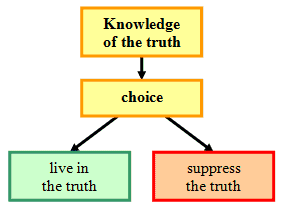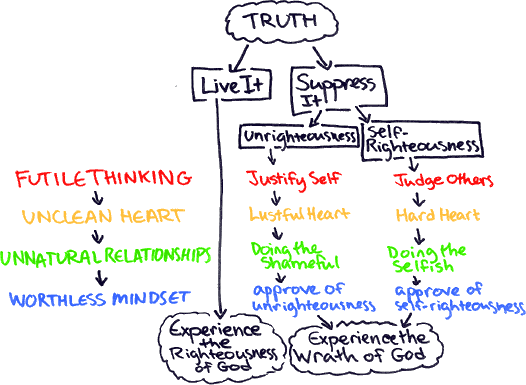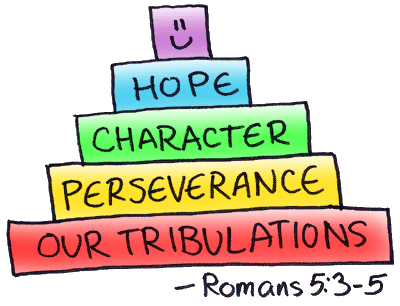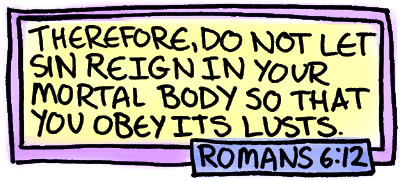Romans
Overview
Author: Paul
Audience: Believers in Rome, a predominantly but not-exclusively Gentile group. “This letter does not preach to the unsaved; the unsaved are never called “God’s beloved,” a term reserved for God’s own children. Romans is intended to teach the saints.” -Chuck Missler
Topic: Romans is about the power of God to set you free to live in God’s righteousness.
Date: “Romans was written at the close of Paul’s third missionary journey during the three months he was in Greece (Acts 20) in either the late winter or the early spring of a.d. 57 or 58. This was just before he returned to Jerusalem with the offering from the Macedonian churches.” -Chuck Missler
Outline

There are many other ways you can break down the sections of Romans, typical alternatives break it into three or occasionally five sections.
|
What God Has Done
|
Effect on You
|
|
|
Ch 1-8 |
Ch 9-11 Dispensational |
Ch 12-16 |
Doctrine – principles and teachings
Dispensation – How God relates to mankind over various periods of time
Practical – how to apply the teachings to your life
|
What God Has Done
|
Effect on You
|
||||
|
Purpose
|
Doctrinal |
Dispensational |
Practical |
||
|
The Gospel
|
Principles of
|
Problems of
|
Practice of
|
||
|
Theme
|
Sin
1:18-3:20 |
Justification
3:21-5:21 |
Sanctification
6:1-8:39 |
Sovereignty
9-11 |
Service
12-16 |
|
Inductive Segment(s)
|
2
|
3
|
4-5
|
6
|
7-9
|
|
Salvation
|
Need for
|
Way of
|
Life of
|
Scope of
|
Service of
|
|
Man’s Righteousness
|
Needed
|
Credited
|
Demonstrated
|
Restored (to Israel)
|
Applied
|
|
God’s Righteousness
|
In Law
|
Imputed
|
Obeyed
|
In Election
|
Displayed
|
|
God’s
|
Holiness
In Condemning Sin |
Grace
in Justifying Sinners |
Power
in Sanctifying Believers |
Sovereignty
in Saving Jew & Gentile |
Glory
the Object of Service |
Sin – deliberate disobedience to the word of God
Justification – To be made righteous
Salvation – deliverance from sin
Sanctification – being made holy (set apart for a sacred purpose)
Sovereignty – the right of God to do whatever he wishes with creation
Service – work done for another
A slightly longer summary:
| Segment | Ch. | Big Idea |
| 1 | 1:1-1:17 | Be eager to preach the gospel |
| 2 | 1:18-3:20 | |
| 3 | 3:21-5:21 | |
| 4 | 6:1-7:25 | |
| 5 | 8:1-8:39 | |
| 6 | 9:1-11:35 | God now includes us in his eternal plan of revealing his righteousness. |
| 7 | 12:1-13:14 | Effect on your own life |
| 8 | 14-15:13 | Effect on your relationships |
| 9 | 15:14-16:27 | Examples of this lifestyle |
| Symbol(s) | Meaning | Flag Words |
|
|
Causation | Therefore, For this reason |
|
|
Substantiation | For, Because |
|
|
Comparison | Like, As |
|
|
Contrast | But, Yet |
|
|
Interrogation | (Question followed by answer) |
|
|
Particularization | 1. a. b. c. (structure) |
First Segment – Be eager to preach the gospel (Rom 1:1-17)
Who does God call? For what purpose? Does God call the equipped or equip the called?
1:1 – Paul describes himself as a bond-servant. What does it mean to be a bond-servant ? (See Deu 15:12-18 where it describes how one became a bond-servant. Essentially, if a former slave wanted to stay with his owner after he had paid his debt, because he loves his owner and prospers with his owner, he could decide to voluntarily stay as a servant to the master by choice rather than obligation and his ear would be pierced to signify the voluntary bond-servant status.)
Main thought of Segment 1: (I am) eager to preach the gospel because it is the power of God to set people free to believe and be living in God’s righteousness.
Second Segment – God’s Wrath on Suppression of Truth (Rom 1:18-3:20)
Romans 1:19-20…God gives each and every one of us a knowledge of him in our hearts, he has written that knowledge there. Which gives us a choice…we can live in that truth or suppress that truth.

Paul goes on to expand on two ways we suppress the truth, in unrighteousness (the rest of chapter 1) and in self-righteousness (chapter 2). He is comparing the behavior of the ungodly who don’t glorify and thank God to the behavior of the pious and judgmental religious folks who think they’re way better than those sinner folks.
Here’s a summary of the progression from futile thoughts that Paul elaborates on in chapters 1 & 2.
|
|
Suppress the Truth in Unrighteousness Know God but don’t glorify or thank him |
Byproduct |
Suppress the Truth in Self-righteousness Know the judgment of God (but do the same things) but have hard and unrepentant heart |
|
1 |
Justify Self – I’m wise, others are not – Glorify the physical |
Futile Thinking + Darkened heart (self-deception) |
Judging Others – I’m good/better – Ignore consequences |
|
2 |
Lustful Heart – Dishonoring of your body – Living for the physical |
Unclean Heart Distorted Perspective |
Hard Heart – Despite God’s goodness – See others as the problem |
|
3 |
Doing What is Shameful – what feels good – lose sense of what is normal |
Unnatural Relationships (destructive lifestyle) |
Doing what is selfish – What is best for me – Lose a sense of what’s true |
|
4 |
Approve of Unrighteousness – sexual immorality – envy – wickedness – murder – covetousness – strife – backbiters – gossip – etc. |
Worthless Mindset (deadened thinking) |
Approve of self-righteousness – doesn’t matter what I do, but what I know – I’m justified b/c of outward, not inward – I use the law to evaluate others, not myself. |

From there, Romans goes on to show the good news of the righteousness of God being revealed to those who believe in truth, and all kinds of other good stuff like access to God’s grace by faith, a hope that does not diappoint, ability to glory in tribulation that leads to perseverance, character, and hope. And how God has given us reconciliation to himself.
—-
Third Segment – God’s Righteousness to Believers (Rom 3:21-5:21)
Here we see a contrast to the previous segment.

Paul announces the good news that the righteousness of God is revealed to those who believe the truth. And this righteousness is really cool because it depends on God’s righteousness rather than our own righteousness, which means its not in question, its certain.
Moving on to Chapter 4, an example is given from Abraham, who believed God. The result? He was not weak in faith (eg: he did not waver) and strengthened in faith (eg: convinced God is able).
In chapter 5, we discover we have a peace with God, having been justified (pronounced righteous) by faith. And we have access by faith to God’s grace (5:2), and a hope in the Glory of God (5:3,5) that does not disappoint, and are able to glory in tribulation, leading to perseverance, character and hope. And we have been reconciled to God (5:10) AKA he treats us like we’re righteous even though we’re not.
How is righteousness of God revealed? (Rom 3:21-23)
Apart from the law
Through Faith in Jesus
To all and in all who believe (the truth)
<- for there is no difference
<- for all have sinned
experience the righteousness of God rather than the wrath of God. |
Practical Application: Every time you preach the gospel, the opportunity is there for people to believe the truth and be set free from the wrath of God and begin to experience the righteousness of God working out in their life.


Segment 4 – Free from Sin’s Reign (Rom 6-7)

Cutting Through the Reasons we “can’t” have victory over sin
(Romans 6) If there’s more grace than my sin can use up, are we free to sin all the time? Certainly not. Just because there is grace sufficient for every sin, does not give you a license to sin. Just because there is grace there for it, doesn’t mean you should take advantage of it.


The purpose of Grace is to set you free from sin. It’s not just to set you free from the penalty of sin, but from the domination of sin in your life.
Therefore do not let sin rein, don’t let it dominate… What’s the implication of this? You have a choice. Your life is not a product of what other people have done to you. Your life is a product of what you’ve chosen.
What does Paul say that you should see your body as? You should (need to) see your body as a tool that accomplishes something. What should I be presenting my body as a tool to accomplish every day? Righteousness.

Justified -> santified practically (ie: set apart to be used by the Lord and to become more like the Lord)
| Chapters 1-5 | Chapters 6-8 |
| Positional truth of Justification | Practical truth of Justification |
| Justified positionally (cause) | Sanctified (be set apart) practically (effect) |
| Dead in sin | Dead to sin |
| Free from the penalty of sin | Free from the power of sin |
| Salvation is apart from works (cause) | (question that comes up) Will preaching grace cause people just live a loose lifestyle unless you lay down the law? Paul responds to this concern |
More on Romans 6-8
Segment 5 – Help in the spiritual battle (Rom 8)
THEREFORE there is no condemnation for those who are in Christ. Condemnation = what?: condemnation phase (verdict)…then sentencing phase (penalty phase). When you’re in God’s court, the verdict is not guilty…there is no condemnation, guilt.
How can there be no condemnation for you? Your sin (all of it, the sin in your flesh) has already been condemned in Jesus.
Two kinds of people:
- Those who live (walk) according to the flesh – carnal mindset
- Those who walks/lives/behaves according to spirit – spiritual mindset
| Carnally Minded | Spiritually Minded | |
| Have their mind set on… | Things of the flesh – body, food, sex, etc. |
Things of the spirit – God, prayer, etc. |
| This mindset leads to… | Death | Life and peace |
| Relationship to God? | At enmity against God | At peace with God |
Why does God not want you to live in condemnation? focus is on the flesh and your sinfulness. The more you focus on the flesh the more you will struggle w/ it.
A spiritual mindset opens the valve for the spirit of God to begin working in your life.
God can take a body w/ no capacity for righteousness and infuse it w/ the power to live righteously .

You have no obligation to do what your flesh is telling you to do. Stop worrying about what you shouldn’t be doing, start focusing on what you have the opportunity to do. Focus on what HE has done not what YOU have failed to do.
God is not looking to you to make up for (compensate for) your weaknesses. He is stepping in w/ his resurrection power and helping you where you’re the most weak.
Satan is Not God’s Adversary Lie : Satan is an equal adversary to God. Truth: He is a punk. He’s been a loser since day one. He hasn’t won anything ever. Ever. He hasn’t even scored.
A Spiritual mindset would be having the attitude toward today that we have unlimited access to God today.
More than a Conqueror
Segment 6 – God now includes us in his eternal plan (9-11)

Segment 7 – Effect on Your Life (Rom 12-13)

Spiritual gifts are a manifestation of Holy Spirit in your life. So they should reveal something about God to others through you:
| Gift | Shows God is a… |
| Teacher | good communicator |
| Healing | healer |
| Edification | edifier |
| Giving | gracious giver |
| Mercy | merciful |
| Helps | helper |
| Spiritual Gifts should… | Because… |
| Reveal something about God to others through you |
Spiritual Gifts = manifestation of the Holy Spirit |
| Be evident | Manifestation = visible, able to be seen |
| Benefit people (profitable) | given for the profit of all |
| Have a supernatural and spiritual impact |
Miracles, prophesy, discerning of spirits, etc. are types of spiritual gifts |
- manifestation = evident. Shouldn’t be in the dark. You have an obligation to figure it out.
- They should benefit people. Other people should be profited by it.
- Should have supernatural and spiritual impact.
Gifts and callings of God are irrevocable.
Criteria to test prophesy
- Match it up with the word. Is it biblical?
- eg. “God said I should marry (this person)” There are no scriptures saying we should marry someone. Choice = fundamental to marriage. No out of obligation to god. Important to God, his freedom of choice in choosing us. In Isaac and Rebekkah’s case, he knows there are parameters (someone in the same faith family). His servant prays a unique prayer (humble servant to the Lord). Almost always when people say this, it’s a logical claim, not two people who don’t even know each other, its product of our own heart and desire for friends (prophesy vs. your desire)
- Gives direction (turn Tim. in a particular direction toward God) = biblical
- God’s spirit dwells with us. The spirit should respond with an alignment (yeah, that’s from the Lord, or not that didn’t resonate with me)
- Counsel (prophesy should withstand wise counsel)
Segment 8 – Impact on your Relationships (14:1-15:13)
| Who: |
Weak in Faith |
Strong In Faith |
| Eats: | Only veggies | All things |
| Esteems: | One day above another | Every day alike |
| Should: | Don’t judge the strong | Don’t despise the weak |
| Is More: | Legalistic | Liberal |
| Is: | More Strict | Less Strict |
| Needs: | Lots of Rules/Boundaries | Less Rules |
Paul is giving an illustration (diet) here to show the difference between weak in faith and strong in faith.
| The weak in faith is more likely to be legalistic and have a lot of rules and boundaries. These boundaries are what the weak in faith need to have to be secure. You shouldn’t despise someone who is not as strong of faith as you. Little kids thrive on predictable strong boundaries. | Someone strong in faith has a lot of freedom, doesn’t need a lot of rules to know they’re cool with God. |
Paul is not saying one of these is better than the other. He clarifies that we’re not in a position to evaluate each other.
The Flip-side
Now (Rom 14:7-…) there is a double substantiation: We don’t lie to ourselves, so our decisions shouldn’t be for ourselves.
Warning signs:
| Legalism turns nasty when: doing it to conform rather than unto God. |
Liberalism turns nasty when: motivation = to indulge self or peer pressure |
The legalistic saying “those horrible people” about the liberal, and the liberal saying “those boring squares” about the weak is an example of how both sides tend to judge the other.
- My weakness or strength in my faith should affect my relationship with God, not my relationship with others.

Pleasing others for their good not yours leads to edification.
Progression: Don’t despise -> Don’t stumble -> Edify -> Be pleasing
Segment 9 – Living Examples (15:14-16:27)

